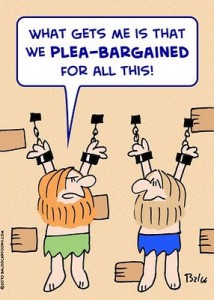To Plea or Not to Plea, That Is The Bargaining Question
As the old saying goes, “don’t do the crime if you can’t do the time.” There’s a lot of truth to the adage, but in this country you don’t necessarily have to do all the time for your crime, if you get what I’m saying.
If you managed to decipher my deviously clever insinuation by answering with “plea bargaining,” you’re right and you get a cookie. In fact, take as many as you want because I still believe they’re a food appropriate for any time of the day despite what some former cookie proponents might say. For those of you who answered good behavior coupled with letters of recommendations from your prosecutors and a positive parole review, then you should stop reading this post right now, you square. Psshhaw…
All joking aside, plea bargaining is an incredibly important and some would say integral part of America’s criminal justice system. It reduces court congestion by allowing prosecutions against criminal defendants to be carried out outside of court without going through a lengthy trial. This resolves each matter quickly and at less cost to the public whose tax dollars fit the bill. It can also benefit defendants by getting rid of the frightening uncertainty of leaving the terms of your sentence to a fickle jury or judge.
 Sound great, right? Well, not necessarily. The intricacies of plea bargaining are many and the way the process works is something everyone should know regardless of which side of the law you normally find yourself falling on. Personally, I’m with the law-abiding citizens of Team Coco.
Sound great, right? Well, not necessarily. The intricacies of plea bargaining are many and the way the process works is something everyone should know regardless of which side of the law you normally find yourself falling on. Personally, I’m with the law-abiding citizens of Team Coco.
But why is it important? It’s simple. Because hiding beneath any benefit, there are always a multitude of negatives waiting to catch you off guard. In the case of plea bargaining, defendants are almost always at a bargaining disadvantage against the more powerful government prosecutors. Plea bargaining also shifts the court away from pursuing justice and toward quick resolutions that can result in poorer investigations by the police, the court, and all the attorneys involved, which all leave defendants in a prejudiced position. This can also force innocent defendants into pleading guilty for crimes they didn’t commit due to fear of being found guilty and receiving a harsher sentence. And let’s not forget about the whole seemingly unconstitutionality of it all.
The plea bargaining process itself is uncomplicated, but the subsequent choice on how to proceed is complex. Usually the lawyers for the prosecution and defense will sit down with the judge and both sides will present their case. Based on how strong the initial evidence is for or against, the defendant usually determines the type of deal the prosecution and judge will give. The negotiation time varies like in any bargaining situation. But once an agreement is reached the lawyer for the defense will approach the defendant with the deal and advise them whether or not to take it. One important note to remember is that it’s always the defendant’s choice whether to take or leave the deal. This is where the situation can become difficult. What should you do in this situation?
The easiest and best answer is to get a good lawyer who can advise you on the best course of action. One that can give you a reasonably certain picture of what can happen in your particular case. And with good reason, as over 90 percent of all criminal cases are resolved via plea bargaining. It’s a shockingly high figure, which makes it all the more important to get a qualified attorney to help you navigate through the process.


Comments